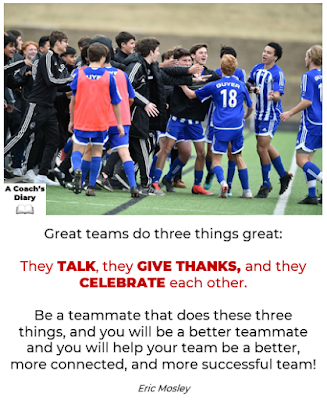Talk, Thank, and Celebrate
Think about it - if you have a connected team where everybody feels like they belong, valued, and are safe competing against a team with athletes who aren't engaged, energized, passionate, and together, of course you have a better chance of winning. This is something that author and HR visionary Eric Mosley has written about and created great teams around, and this is something that can help your team maximize its potential.
When talking to researcher, author, and professor Brene Brown, Eric said that great teams do three things great - they talk, they give thanks, and they celebrate each other.
Great Teams Talk
Eric said that Harvard did a study about the efficacy of regular check-ins and reported that these check-ins helped teams and team members perform better. He said that it didn't matter what they talked about - having any kind of regular conversation can lift performance. Be intentional about finding ways to talk to your teams before, during, and after practice. Taking the time to check in on them before, during, and after practice can bring people together and improve performance. It is easy to let time, different priorities, and life get in the way of interactions. Intentionally make sure that there is an infrastructure and frequency of interaction by finding ways to talk to each other and check-in with each other to bring people together, increase the sense of belonging, and improve performance. Invest time and energy to making sure that talking and communicating with each other are a part of your culture.
Great Teams Give Thanks
When we give thanks, it is like putting deposits of gratitude and positivity into a bank. When adversity hits and times get tough, teammates can pull from those deposits to provide the energy and fuel they need to keep going.
The interesting thing about Eric's research is that while the team benefits when the coach, leader, or boss gives thanks and praise, it is more effective when peers and teammates give praise to each other. While the coach should give praise for a job well done, when a teammate recognizes another teammate, it is authentic because they don't have much to gain. When teammates are intentional about praising other teammates, they have to intentionally think about the positive things that the team is doing instead of the negative. When a teammate praises another teammate, that teammate feels better about the work they do, they feel like they are seen and valued, and the relationship between the two is deepened because they had a real, authentic, and honest moment of shared respect and appreciation.
Creating a culture of gratitude and thanks can transform your team and your teammates.
Great Teams Celebrate Each Other
Eric says that we underestimate the power of celebration. He asked, "At the end of your career, will you be more fixated on the things that you have achieved or on the people you have met and the relationships that you have built along the way?"
Think about the MVP of your favorite sports league just five years ago. Can you remember who they were? How about the MVP of your favorite sports league just two years ago; can you remember them? Now, think about your favorite teacher? Can you remember them? We remember people and the impact that they have had on our lives more than anything. It is important it is to celebrate each other.
Eric says that team members have to be free to express themselves. When we create an environment where they are allowed to be who they are and where they are allowed to make and learn from mistakes and be vulnerable, we have created a space for them to be their most innovative and imaginative to express themselves and perform our best.
Creating a culture of thanking, talking, and celebrating each other can build a shared sense of purpose, meaning, happiness, and energy in your team. This allows and inspires people to be who they are, and that allows them to do their best work.
References
Brown, Brene. "Brene With Eric Mosley on Making Work Human." Dare to Lead with Brene Brown, 23, November 2020, https://brenebrown.com/podcast/brene-with-eric-mosley-on-making-work-human/#close-popup.




Comments
Post a Comment